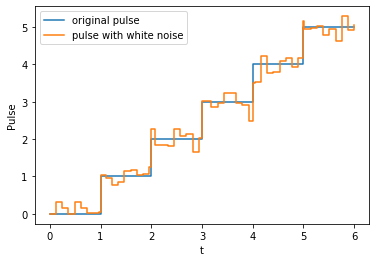Summary GSoC 2019
As we are approaching the end of this GSoC project, it is time to write a summary of the whole GSoC project. During the last two and a half months, the project basically followed the main points in the proposal and adapted the implementation details to the real situation. The final delivery of this project is a NISQ (Noisy Intermediate-Scale Quantum) simulator based on the QuTiP open system solver. It offers a framework for simulating quantum device. Three examples, the SpinChain, CavityQED and OptPulseProcessor demonstrate how to implement a concrete model. In addition, we add a noise module as a framework for simulating device-dependent noise in the system. The main pull request is at https://github.com/qutip/qutip/pull/1065.
This GSoC project has been the main theme of my past few months. Before this project, my programming experience is only on home-work level and only for self-use. This is the first time that I work on a project that is going to be released and used by the others. Now I'm more familiar with programming collaboratively with others. From this project, I also learned a lot beyond programming skills, such as how to write a proposal, how is a Python package structured and how to build documentation. Working on a Python package gives me a deeper understand and encourages me to take one step further. Instead of installing a package and simply using it as instructed, now I would also like to look at the source code and maybe even customize it for my own requirements.
Apart from the coding aspect, working remotely together with a team is also completely new for me. It is a challenge since one has to describe ideas and express oneself in words through a video chat instead of a face-to-face conversation. It is clearly also a necessary skill in the future. I enjoyed working together with the QuTiP community, especially my mentors, who gave me a lot of help in this project. They also introduced me further to their research groups and offer me other opportunities for my future study and career. It has been a good experience working with all of them. Although this project is coming to an end, I'd really like to keep in touch and continue working with them in the further.
This GSoC project has been the main theme of my past few months. Before this project, my programming experience is only on home-work level and only for self-use. This is the first time that I work on a project that is going to be released and used by the others. Now I'm more familiar with programming collaboratively with others. From this project, I also learned a lot beyond programming skills, such as how to write a proposal, how is a Python package structured and how to build documentation. Working on a Python package gives me a deeper understand and encourages me to take one step further. Instead of installing a package and simply using it as instructed, now I would also like to look at the source code and maybe even customize it for my own requirements.
Apart from the coding aspect, working remotely together with a team is also completely new for me. It is a challenge since one has to describe ideas and express oneself in words through a video chat instead of a face-to-face conversation. It is clearly also a necessary skill in the future. I enjoyed working together with the QuTiP community, especially my mentors, who gave me a lot of help in this project. They also introduced me further to their research groups and offer me other opportunities for my future study and career. It has been a good experience working with all of them. Although this project is coming to an end, I'd really like to keep in touch and continue working with them in the further.

I think I speak for all the mentors when I say that it has been a great pleasure working with you. You have done work of a very high quality with great diligence. I am very happy to hear that you would like to continue working with us. You continued help with QuTiP will be very welcome, by the team, and all the QuTiP community.
ReplyDelete